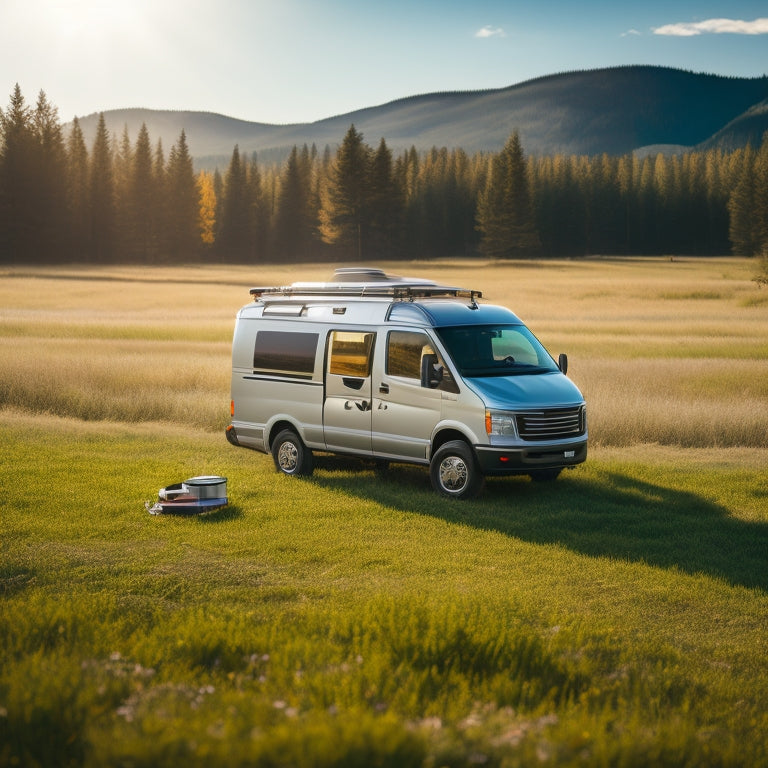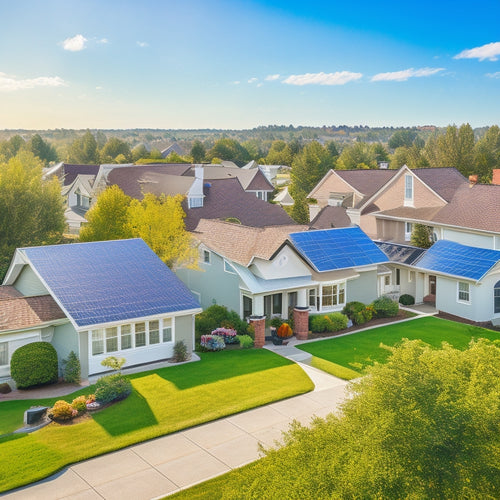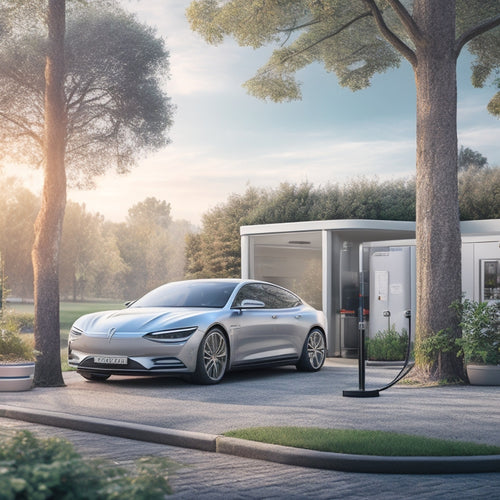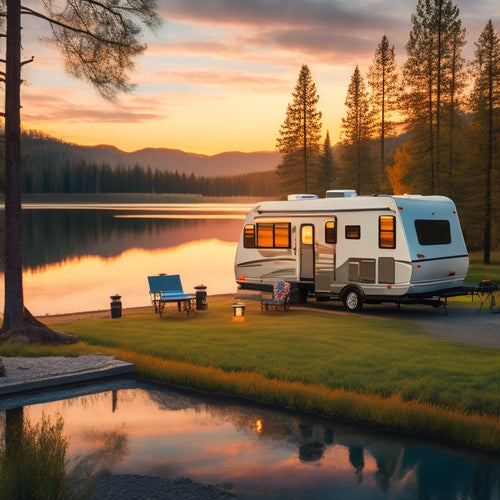
What Solar Panels Are Best for Camper Vans?
Share
When outfitting your camper van for off-grid adventures, you'll want solar panels that meet your energy needs and fit your van's unique constraints. Top brands like Renogy, HQST, and WindyNation offer high-quality panels with exceptional performance and durability. Consider flexible panels for irregular rooflines or rigid panels for a cost-effective solution. Monocrystalline panels provide higher efficiency, while polycrystalline panels are more budget-friendly. Your specific needs, budget, and roof space will determine the best panels for you. By exploring your options, you'll find the perfect balance of power and portability, enabling the freedom to roam wherever the road takes you.
Key Takeaways
• Consider energy demands for appliances and gadgets to determine the required solar panel capacity for your camper van.
• Top brands like Renogy, HQST, and WindyNation offer high-quality solar panels with exceptional performance and durability.
• Choose between monocrystalline and polycrystalline panels based on budget, energy needs, and preferences.
• Flexible solar panels are ideal for irregular rooflines or obstructions, while rigid panels provide a traditional and cost-effective solution.
• Evaluate factors like power output, dimensions, and integration with the van's roof when selecting the best solar panels for your camper van.
Understanding Camper Van Solar Needs
When equipping your camper van with solar panels, you need to take into account the unique energy demands of life on the road, from powering appliances and gadgets to maintaining a comfortable living space. You're not just thinking about keeping your phone charged; you're aiming for an off-grid lifestyle that's free from the constraints of traditional power sources.
Energy independence is the ultimate goal, and it requires careful assessment of your camper van's energy needs. To achieve this independence, you'll need to evaluate your energy usage, including the power requirements of your fridge, lights, and other essential systems.
You'll also need to contemplate the size and capacity of your solar panel system, as well as the type and quality of the panels themselves. By understanding your camper van's energy needs, you can design a solar panel system that meets your specific requirements, ensuring you have a reliable source of power wherever your adventures take you.
With the right system in place, you'll be able to enjoy the freedom and flexibility that comes with living off the grid.
Top Brands for Camper Van Solar
Three industry leaders stand out for their high-quality camper van solar panels: Renogy, HQST, and WindyNation. When it comes to choosing the best solar panels for your camper van, you want a brand that offers thorough performance, durability, and exceptional customer support. You'll find that these top brands deliver on these expectations.
Renogy is known for its high-efficiency solar panels, designed to maximize energy output even in low-light conditions.
HQST, on the other hand, offers a range of solar panels that cater to different camper van needs, from budget-friendly options to high-performance models.
WindyNation, meanwhile, is revered for its premium solar panels that boast impressive power output and a solid brand reputation.
What sets these brands apart is their commitment to customer support. You'll get extensive warranties, dedicated customer service, and in-depth resources to help you installation and maintenance.
With these top brands, you can trust that you're investing in a reliable and efficient solar panel system for your camper van. By choosing one of these brands, you'll be part of a community that values quality, performance, and exceptional customer support.
Monocrystalline Vs Polycrystalline Panels
You'll likely encounter two main types of solar panels on the market: monocrystalline and polycrystalline, each with its own strengths and weaknesses that can have a significant impact on your camper van's energy output. Understanding the differences between these two types is essential to choosing the best solar panels for your camper van.
When it comes to cell structure, monocrystalline panels have a more uniform crystal structure, which allows for better electron flow and higher efficiency. Polycrystalline panels, on the other hand, have a more varied crystal structure, leading to lower efficiency. However, this difference in efficiency is often exaggerated, and the real-world impact is minimal.
Here's a comparison of monocrystalline and polycrystalline panels:
| Feature | Monocrystalline | Polycrystalline |
|---|---|---|
| Cell structure | Uniform crystal structure | Varied crystal structure |
| Efficiency | Higher (15-20%) | Lower (12-15%) |
| Cost | Generally more expensive | Generally less expensive |
| Performance | Better low-light performance | Similar performance |
Don't fall for efficiency myths – both types of panels can provide reliable energy for your camper van. Consider your budget, energy needs, and personal preferences when making your decision.
Flexible Solar Panels for Camper Vans
Flexible solar panels provide a convenient solution for camper vans with irregular rooflines or obstructions, as they can be easily mounted on curved or uneven surfaces. The flexible design of these panels allows for seamless integration with your van's unique roof shape, ensuring a secure and reliable energy source on the go. The flexibility of these panels also enables them to withstand the vibrations and movements of your camper van.
Moreover, flexible solar panels are incredibly lightweight and portable, making them an ideal choice for camper vans. You can easily install them on your roof without adding significant weight to your vehicle. This means you can enjoy the benefits of portable charging without compromising your van's performance. With flexible solar panels, you'll have the freedom to explore the great outdoors while keeping your devices powered up.
Whether you're camping, hiking, or simply enjoying a scenic drive, these panels will provide you with a reliable source of energy.
Rigid Solar Panels for Camper Vans
Rigid solar panels, designed for camper vans, offer a more traditional and cost-effective solution, providing a higher power-to-weight ratio compared to their flexible counterparts. You'll appreciate the robust panel frames, which guarantee durability and resistance to harsh weather conditions. When choosing rigid solar panels, consider the mounting options that best fit your camper van's roof. You can opt for a fixed mount, which offers a secure and permanent installation, or a tilt mount, which allows for adjustability to maximize energy harnessing.
Here's a comparison of popular rigid solar panels for camper vans:
| Model | Power Output (W) | Dimensions (inches) |
|---|---|---|
| Renogy 100W | 100 | 39.7 x 26.4 x 1.4 |
| WindyNation 100W | 100 | 39.5 x 26.1 x 1.3 |
| HQST 100W | 100 | 39.5 x 26.1 x 1.3 |
| ALLPOWERS 100W | 100 | 39.5 x 26.1 x 1.3 |
| HQST 150W | 150 | 47.5 x 26.1 x 1.3 |
When selecting a rigid solar panel, consider factors such as power output, dimensions, and mounting options to guarantee a seamless integration with your camper van's roof.
Solar Panel Efficiency Explained
When you're selecting solar panels for your camper van, understanding solar panel efficiency is essential.
You need to know how different cell types, such as monocrystalline or polycrystalline, impact energy output.
High-Efficiency Cell Types
You'll want to prioritize high-efficiency cell types in your camper van's solar panel system, as they can greatly enhance energy output per unit area. This is especially vital for camper vans, where space is limited and every watt counts. High-efficiency cell types, such as monocrystalline and bifacial cells, offer superior energy output compared to traditional multicrystalline cells.
| Cell Technology | Efficiency Range | Advantages |
|---|---|---|
| Monocrystalline | 18-22% | High efficiency, space-saving |
| Bifacial | 18-22% | High efficiency, captures light from both sides |
| Multicrystalline | 15-18% | Affordable, reliable |
| PERC | 18-20% | Improved efficiency, durable |
| Thin-Film | 7-14% | Flexible, lightweight, affordable |
When choosing a high-efficiency cell type, consider factors such as your energy needs, budget, and available roof space. By selecting the right cell technology for your camper van, you can maximize your energy output and enjoy the freedom to explore off-grid.
Energy Output Factors
Your camper van's solar panel efficiency is determined by several key factors, including temperature, irradiance, and angle of incidence, which can greatly impact the amount of energy your system generates. These factors can either enhance or hinder your solar panel's energy output, so it's vital to understand how they interact.
Temperature, for instance, can notably affect energy efficiency. High temperatures can reduce your solar panel's energy output, while cooler temperatures can increase it.
Irradiance, or the amount of sunlight your solar panel receives, also plays an important role. The more direct sunlight your panel receives, the more energy it will generate.
The angle of incidence, or the angle at which sunlight hits your panel, is also key. A shallow angle can decrease energy output, while a perpendicular angle can maximize it.
When selecting solar panels for your camper van, look for those with high power density, which measures the amount of energy generated per unit area. Higher power density means more energy can be generated in a smaller space, making it ideal for camper vans with limited roof space.
Choosing the Right Wattage Output
Determining the right wattage output for your camper van's solar panel system depends on your energy needs and usage patterns. You'll want to take into account how much power you need to generate daily to keep your batteries charged.
A Wattage Calculator can help you estimate your energy requirements based on your appliances' power consumption and usage frequency.
When choosing the right wattage output, prioritize your power needs. Identify your essential appliances, such as lights, fridge, and laptops, and allocate power accordingly. If you have multiple devices with high power requirements, you may need a higher wattage output.
Take into consideration your camping habits, too - do you boondock frequently or stay in campsites with hookups? This will help you determine how much energy you need to generate daily.
Camper Van Roof Size Considerations
When selecting solar panels for your camper van, you'll need to take into account the available roof space to determine the maximum panel size and configuration.
You'll want to measure your roof carefully to guarantee a snug fit, taking into consideration any obstacles like vents, skylights, or roof racks.
Measuring Your Roof Space
Measuring your camper van's roof space is crucial to guaranteeing a precise fit for your solar panels. You'll want to take accurate measurements to avoid any costly mistakes or inconvenient returns. Start by identifying any roof obstacles, such as vents, skylights, or antennas, which can impact the placement of your solar panels. Take note of their location, size, and shape to make sure your solar panels can fit around them.
Next, consider the space constraints of your camper van's roof. Measure the length, width, and any curved or angled sections. You may need to adjust your solar panel configuration to accommodate these unique features.
Don't forget to account for any additional equipment, such as a roof rack or satellite dish, which may affect your solar panel placement.
Panel Orientation Matters
You'll want to optimize your solar panel orientation to guarantee maximum energy harvesting, and that starts with understanding how your camper van's roof size influences panel placement. The roof's size and shape will dictate the size and number of solar panels you can fit, which in turn affects the overall energy output.
When considering panel orientation, keep in mind the following key factors:
-
Panel Angle: A tilting system can help you adjust the panel angle to maximize energy harvesting. However, be mindful of the added complexity and potential shading effects.
-
Shading Effects: Be cautious of obstructions like roof vents, skylights, or antennas that can cast shadows on your solar panels, reducing their efficiency.
-
Roof Obstacles: Take into account any roof obstacles, such as air conditioning units or satellite dishes, that may impact panel placement and overall energy output.
Weight Capacity Concerns
Taking into account your camper van's roof size and weight capacity will have a significant impact on the type and number of solar panels you can safely install. So, it's important to evaluate the roof's load-bearing capabilities before making a purchase.
You need to make sure that your camper van's roof can handle the weight of the solar panels, batteries, and other equipment without compromising its structural integrity.
To determine the weight capacity of your camper van's roof, you'll need to perform load calculations. This involves calculating the weight of the solar panels, mounting hardware, and other equipment, and comparing it to the roof's maximum weight capacity.
You should also consider the weight distribution and make certain that the load is evenly distributed across the roof to prevent damage or collapse.
Solar Panel Durability and Lifespan
When it comes to outfitting your camper van with solar panels, durability and lifespan are essential aspects to ponder, as they directly impact the overall performance and reliability of your off-grid energy system. You want to make sure that your solar panels can withstand the harsh outdoor conditions and continue to generate power efficiently.
To achieve this, look for solar panels with the following features:
-
Weather Resistance: A durable and waterproof design that can withstand rain, snow, and extreme temperatures.
-
Corrosion Protection: A protective coating or anodizing that prevents corrosion and guarantees the panels remain functional even in humid or salty environments.
-
UV Stabilization: A special treatment that prevents the panels from degrading due to prolonged exposure to UV radiation.
Budget-Friendly Solar Panel Options
When shopping for budget-friendly solar panels for your camper van, you'll find that there are several affordable brands available that offer reliable performance without breaking the bank.
You can also reduce costs by exploring low-cost installation options, such as DIY kits or refurbished panels.
Affordable Brands Available
You can find reliable and affordable solar panels for your camper van from brands like Renogy, WindyNation, and HQST, which offer quality products at a lower cost without sacrificing performance. These brands provide budget-friendly options without guaranteeing performance, making them an excellent choice for camper van owners.
Some of the key benefits of these affordable brands include:
-
Cost-effective: Renogy, WindyNation, and HQST offer solar panels at a lower cost compared to premium brands, making them an attractive option for those on a budget.
-
High-efficiency cells: Despite being budget-friendly, these brands use high-efficiency cells to secure maximum energy output from your solar panels.
-
Durable and long-lasting: These affordable solar panels are built to last, with durable materials and a robust design that can withstand the demands of camper van life.
Low-Cost Installation Options
To further reduce costs, consider installing your solar panels yourself or opting for pre-drilled panels that simplify the installation process. By taking the DIY route, you can save on labor costs and enjoy a sense of accomplishment. However, if you're not comfortable with heights or electrical work, it's essential to weigh the risks and consider hiring a professional.
Another cost-effective option is to opt for solar panels with pre-drilled holes, which eliminate the need for additional hardware and reduce installation time. This can lead to significant cost savings, as you'll require fewer materials and less labor. Additionally, many manufacturers offer pre-drilled panels specifically designed for camper vans, making the installation process even more streamlined.
Efficient Energy Output
By prioritizing efficient energy output, camper van owners can achieve reliable power generation while staying within budget, as budget-friendly solar panel options often boast impressive wattage per dollar ratios. This means you can enjoy a Power Boost without breaking the bank. When it comes to Energy Savings, every little bit counts, and efficient solar panels can make a significant difference.
Here are some key benefits to consider:
-
Higher wattage ratings: More power per panel means you can generate the energy you need with fewer panels, saving you space and money.
-
Improved conversion efficiency: Advanced technology allows for a higher percentage of sunlight to be converted into usable energy, giving you more bang for your buck.
-
Durable and long-lasting: Efficient solar panels are built to last, withstanding the elements and providing reliable power generation for years to come.
Frequently Asked Questions
Can I Charge My Camper Van Batteries With Solar Panels at Night?
You can't charge your camper van batteries with solar panels at night, as solar panels require sunlight to generate power, but you can maintain battery health by ensuring a full charge before nighttime and using a smart charger.
Do Solar Panels Work on Cloudy or Rainy Days?
You'll still generate some energy on cloudy or rainy days, but output will be reduced; invest in energy storage and power optimization to minimize losses and guarantee a steady supply when you need it most.
Can I Walk on Flexible Solar Panels on My Camper Van Roof?
"Fearless adventurer, you're wondering if you can tread on those flexible solar panels on your camper van's roof. Generally, it's not recommended, as excessive foot traffic may compromise roof durability and panel flexibility, affecting their performance."
Are Solar Panels Affected by Extreme Temperatures?
You'll find that solar panels are indeed affected by extreme temperatures, as high heat reduces their efficiency. Thermal resistance increases with temperature, hindering heat dissipation, so it's crucial to take into account temperature coefficients when selecting panels for your camper van.
Can I Install Solar Panels on a Curved Camper Van Roof?
"Will your solar panel dreams be shattered by your curved camper van roof? Fear not! You can install panels on a curved surface, but be prepared to navigate roof obstructions and potential energy losses."
Related Posts
-

What Does Residential Solar Panel Installation Cost?
You're looking to Install residential solar panels, but you're wondering what it'll set you back. On average, you can...
-

7 Best Home Electric Vehicle Charging Station Setups
When selecting a home electric vehicle charging station setup, consider a Level 2 charging station with a dedicated 4...
-

Why RV Owners Need Solar Panels for Battery Life
You can greatly extend the life of your RV's batteries by switching to solar power. By harnessing the sun's energy, y...


